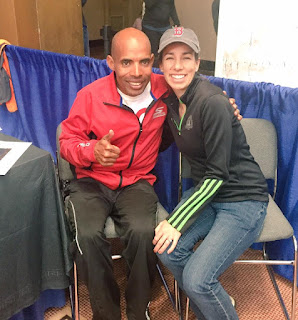Because I live in DC and have my
pulse on the major running events, I tend to have a good sense of what big
races are happening each weekend, and last weekend was the Cherry Blossom Ten
Miler. I’ve run it three times, and it is the premier “rite of spring” race in
the city, doubling as the USATF (the official running organization), so top
runners who often go on to become great marathoners, come to town, and the expo
also tends to feature some of the greats, like Billy Rodgers and Joan Benoit
Samuelson.
So, I was beyond thrilled to hear that
Meb Keflezghi, one of the greatest American marathoners, was coming to town and
speaking. Because they were open to the public (and not just registrants), I
seized the opportunity to go and hear him talk.
There are so many reasons to love
Meb. He represents the immigrant/American dream. He shows time and time again
what it means to work hard, day in and day out. I loved his book, Race to Overcome, and his story really
is a series of chapters when he overcomes the odds, and works to achieve seemingly
insurmountable goals.
While his times are “soft” in
comparison to national and world records in the marathon, Meb remains one of
the greatest marathoners. He is the only person (not only American, only
person) to win an Olympic marathon medal, the New York City Marathon, and the
Boston Marathon. Some would wear this Triple Crown with arrogance, and
well-deserved haughtiness. After all, running over 100 miles a week for two
decades, sacrificing so much, to achieve those highest accolades in competitive
running, would entitle someone to such arrogance. But Meb is the people’s
champion again and again.
When Meb won the Boston Marathon in
2014, the first American to do so in almost 30 years, and a year after the
horrific bombing, he did so while wearing the names of the victims. For him,
this was not just a symbolic gesture. It was clear that he carried them in his
heart while he trained day in and day out.
I realized afterwards that I’ve now met all four living American
Olympic marathon medalists, all of whom represent greatness in their own ways.
Joan Benoit Samuelson
Frank Shorter
Then I met the two 2004 Athens Olympic medalists, who really
did revitalize American running. I can’t say that first-hand (I had just
graduated high school the summer of 2004 and was too busy getting ready for
college to even grapple with the idea of the marathon).
 But once I was introduced to Deena Kastor as the face of
American distance running, has been a role model and hero for me, and meeting
her in 2013 was a game changer.
But once I was introduced to Deena Kastor as the face of
American distance running, has been a role model and hero for me, and meeting
her in 2013 was a game changer.
And finally, I got to meet the king of American marathoning, and when you meet the King, you dress for royalty.
Dear Meb, it was a pleasure meeting you.
As evident in the post race press conference after you punched
your ticket to Rio, it's clear that it's not just us average runners who adore
you, but your fellow Olympians do too.
You have showed Americans time and time again that there is hope
after heartbreak, but those feelings of hope and optimism also come from hard
work and a #RunToWin attitude.
 Family life: as an immigrant family who left
war-torn Eritrea in search of a better life and took to it diligently. Your
father patiently taught you and your siblings English and you all got quality
educations. You are raising daughters and modeling for them a hard working
spirit and attitude, something that gives me hope for the next generation.
Family life: as an immigrant family who left
war-torn Eritrea in search of a better life and took to it diligently. Your
father patiently taught you and your siblings English and you all got quality
educations. You are raising daughters and modeling for them a hard working
spirit and attitude, something that gives me hope for the next generation.
Really, I got about two minutes with you. But what you
represent and stand for is bigger than that, and I think that’s why it was
important for me to meet you in person, and to thank you for what he has done
for our sport and to revitalize the American spirit after Boston.
There is a reason why athletes can be role models. And many
succumb under the pressure of the spotlight. But those like Meb, who carry the
mantle of responsibility seriously and with pride, you give those of us who run
behind you a lot of ideals to chase. Thank you.
A big fan, Vanessa

